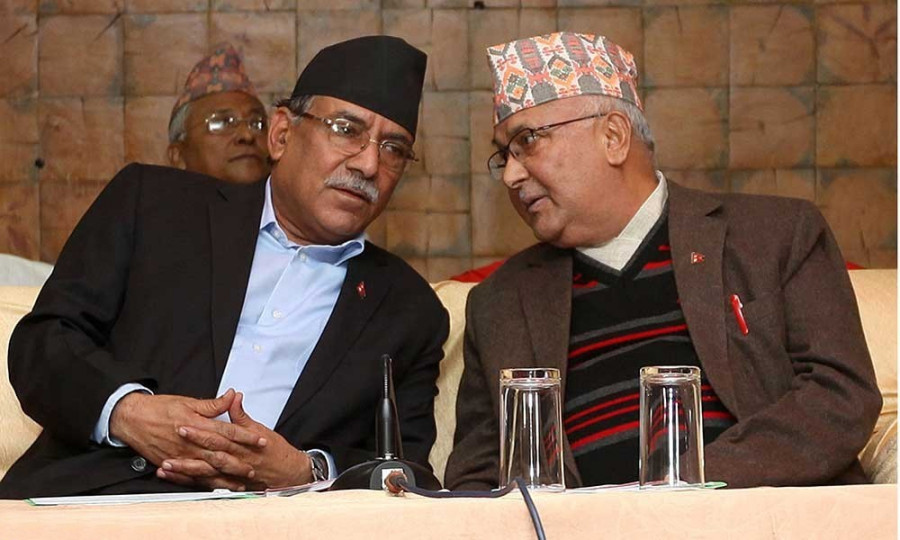Politics
Continued political interference is weakening crucial constitutional bodies
Though such commissions are envisioned as independent agencies, parties have not allowed them to function independently, experts say.
Tika R Pradhan
The government in March formed a committee to recommend officials for two transitional justice commissions. The committee is yet to recommend names. Led by a former Supreme Court chief justice, the committee was supposed to function independently. However, the way political parties have interfered in the selection process, its independence appears to be nothing but a sham.
Last month, the ruling and opposition parties reached a deal on who should lead the Truth and Reconciliation Commission and the Commission of Investigation on Enforced Disappeared Persons.
These two commissions were envisioned by the Comprehensive Peace Agreement, which ended the decade-long Maoist war, and their terms were to end after completing their tasks. By that extension, these commissions are temporary in nature.
Political intervention, however, has been rampant in all such constitutional commissions, some of them are permanent in nature, which experts say has weakened them over the years.
Some crucial constitutional commissions are still without chiefs and officials four years after the promulgation of the constitution.
While commissions like Dalit Commission, Tharu Commission, Muslim Commission National Human Rights Commission and National Women Commission have human rights and social justice objectives, there are others, including the Commission for Investigation of Abuse of Authority, Public Service Commission and Election Commission, which work as public oversight agencies. That’s why these bodies’ role is considered crucial in upholding human rights and social justice and functioning of democracy.
To keep democracy in good working order, experts say, it needs to be constantly oiled, for which impartial and independent constitutional bodies are envisioned. But when political parties appoint their loyalists, commissions lose their credibility as they function more as obsequious agencies rather than oversight mechanisms.
“Unless the practice of appointing people with political connections is stopped, constitutional commissions can never maintain an impartial image,” said Geja Sharma Wagle, a political commentator.
Political sharing in appointments is so rife that such commissions often fail to get officials for months. Earlier, political instability and long-drawn transition were blamed for the failure to timely appoint officials to government bodies. But with political stability restored and a strong government installed, political intervention should have been stopped to make the commissions strong, impartial and effective, according to analysts.
“If this government, which has a two-thirds majority, wants, it can start afresh,” said Wagle. “The stronger such commissions are, the better the governance is, and it will ultimately help improve the incumbent government’s image.”
While several commissions are languishing from a lack of chiefs and officials, the government now is planning to appoint a new team in the National Information Commission.
A meeting of the recommendation committee, led by Deputy Speaker Shiva Maya Tumbahangphe, has sought applications from interested candidates to apply for the post of chief commissioner and two commissioners. According to the Right to Information Act 2007, the three-member recommendation committee includes the minister for communication and information technology and chairman of the Federation of Nepali Journalists as members.
The National Information Commission is an independent body under the Ministry of Communication and Information Technology. The term of the current team at the commission ends on January 9.
Officials familiar with the development say despite calling applications, the ruling Nepal Communist Party (NCP) has already finalised the list of individuals, at least two, to be appointed at the Information Commission.
Advocate Baburam Aryal, who was involved in the campaign for the right to information, said the Information Commission has been turned into a place for parties to manage their cadres.
“It has become a trend; parties have always been sharing positions in such a powerful independent body with the authority to even issue directives to independent state organs and commissions when it comes to the right to information,” said Aryal. “If we really want results, the appointment process needs to be corrected.”
According to Rajendra Maharjan, a political analyst who is also a columnist for Kantipur, the Post’s sister paper, parties have invariably failed to uphold their promises of appointing officials without political intervention.
“Whether it is the ongoing justice appointment incident or appointment in constitutional commissions, parties are not for installing competent people; they want their people,” said Maharjan. “Independent commissions enhance democracy, help establish the rule of law and maintain checks and balances. But to keep them independent, they should have independent, efficient and competent officials.”




 11.12°C Kathmandu
11.12°C Kathmandu















